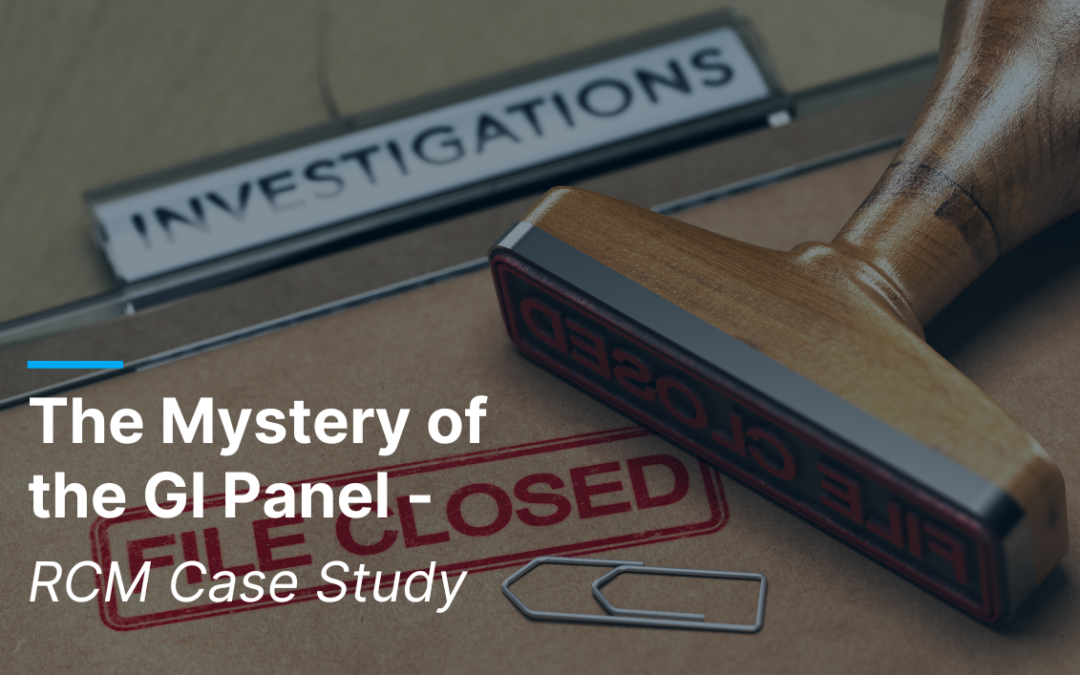By: Dyana Williams, Client Engagement, Lighthouse RCM Solutions
The following is a case study of a Gastrointestinal (GI) panel billing issue we helped a client navigate. The blog takes a light-hearted approach and unpacks the problem in the format of classic hardboiled detective stories.
The setup
The dim glow of my office lamp cast long, ghostly shadows across the worn wooden desk. The soft patter of rain on the windowpane provided the perfect backdrop for one of those mysterious cases that have a way of finding me. I took a drag from my cigarette, letting the smoke curl around my fedora, and stared at the file on my desk. It was labeled “The Case of the GI Panel.”
In the murky world of clinical laboratory billing, a dame named Complexity had been my constant companion. It was a web of codes, criteria, and insurance providers, and I was about to take a dive into the deep end of it.
The payer’s view
I’d heard about a suggested GI Panel, a real head-scratcher. This panel had it all – 21 different species, but only one single Current Procedural Terminology (CPT) code could be billed: 87507. My sources had told me that insurance providers had their own views on this case, and it was my job to make sense of it all and get fair reimbursement for my client.
First up was Anthem Blue Cross. They said this panel might be medically necessary, but only under specific conditions. Those conditions were the keys to the kingdom, and I had to understand and document them carefully.
Then there was Blue Shield of California. They were a tough nut to crack, classifying all GI panels as investigational. That meant they might not play ball when it came to reimbursement.
Kaiser was the next player in this complex game. They had a specific playbook – CPT 87507 was approved for certain patients in particular places of service. The devil was in the details, and my client was counting on me to get those details straight.
HealthNet had its own take. They said CPT 87507 was not medically necessary, but CPT 87505 (for 3-5 targets) might be on the table based on the diagnosis. Putting it all together was like walking on a tightrope.
And then there was UnitedHealthcare (UHC). They were a puzzle too, recognizing the potential medical necessity of CPT 87505-87506 but giving a thumbs-down to CPT 87507.
With all these insurance providers throwing their hats into the ring, it was clear that this case was no walk in the park. It was a maze of codes, rules, and requirements, and the wrong move could lead to claim denials and lost reimbursement.
The solution
Fortunately, I was able to unpack this case with an assist from my coding colleagues with Lighthouse RCM Solutions. These were the people who knew the ins and outs of clinical laboratory billing. They were the ones who could help navigate this tangled web.
By working with them, we could connect my client with a trusted billing vendor who could deftly code and bill for these tests, maximizing reimbursement while sidestepping denials. Our skilled practice managers would oversee the entire operation, ensuring that every ‘i’ was dotted, and every ‘t’ was crossed. Our business consultants who specialized in clinical laboratory operations would guide the way, streamlining processes and providing expert insights.
It was leaning on my team’s expertise that meant the difference between success and failure for our client in the world of clinical laboratory billing. With our collective efforts now on the case, we would decipher the insurance provider cryptic language, ensure that medical necessity documentation was rock solid, and help make sure every ‘claim’ was a winning one moving forward.
And as I leaned back in my creaky chair and laid this plan out for my client, they quickly realized that collaborating with our experts was the smart play from the start. It was the key to unlocking the treasure trove of compliant billing policies, protection of reimbursement, reduced denials, efficiency, risk mitigation, and above all, peace of mind.
The takeaways
This case was a real eye-opener and underscores a crucial lesson for this client: Labs shouldn’t take their RCM lightly. The kind of know-how you need is developed through time and experience, like a well-worn fedora. The clinical lab revenue cycle needs a firm hand, it needs to be MANAGED. This isn’t a game that just anyone can play. You gotta know the ropes and understand the lay of the land, or you’ll be in hot water faster than you can say “payer claw-back.”
In the end, the “Case of the GI Panel” wasn’t just about numbers and codes; it was about knowing who to trust in a world of uncertainty. And for a private eye like me, that made all the difference.
Looking for help solving your lab’s billing mysteries? Contact us today for a free consultation!
